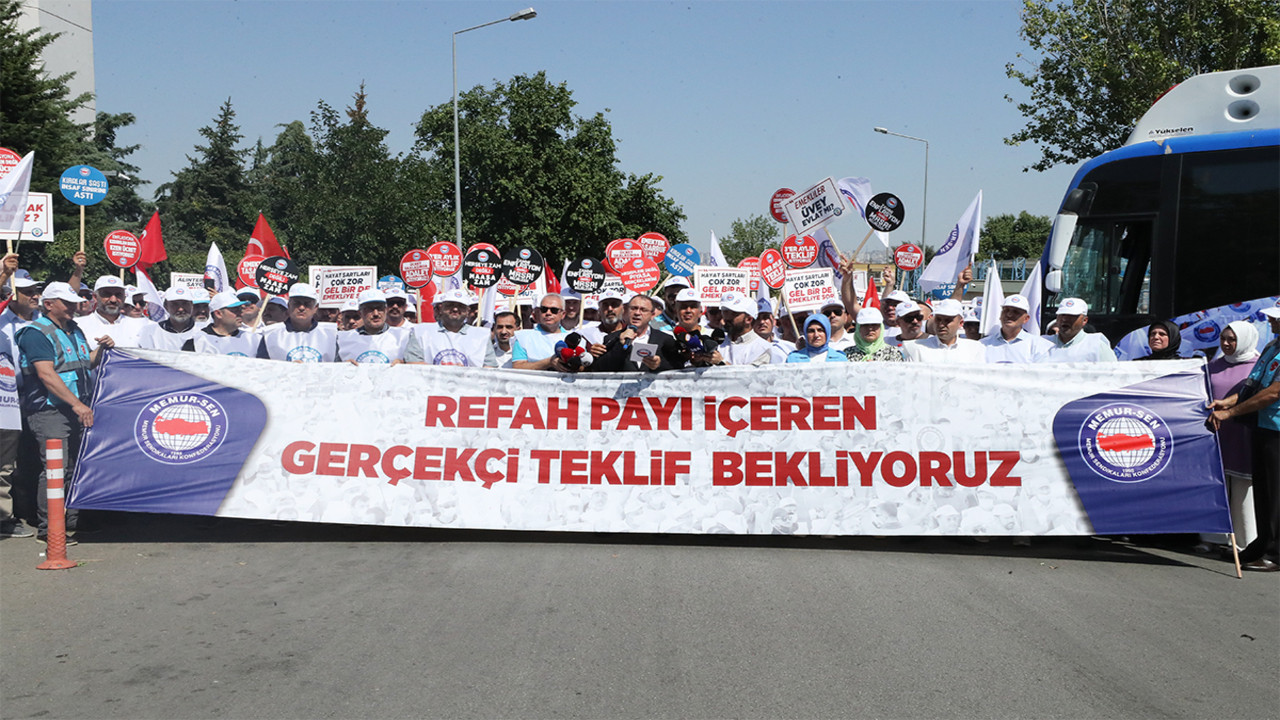Negotiations between Turkish gov’t and public servants union reach impasse over salary raise
The Turkish government and the public servants union failed to reach an agreement on the general salary increase rate for 2024-2025 during collective bargaining negotiations concerning approximately four million civil servants and 2.5 million pensioners.
Duvar English
Ongoing collective bargaining negotiations since Aug. 1 have failed to yield an agreement between the Public Employers Comittiee and the Confederation of Public Servants Trade Unions (Memur-sen) regarding the general salary increase to be implemented for the 2024-2025 period.
Although they could not agree on the increase rate, the parties completed the collective bargaining process with an agreement in 11 service branches during the last meeting in Aug. 22.
7. Dönem Toplu Sözleşme Kısmi Mutabakatla Sonuçlandı
— Memur-Sen (@MemurSenKonf) August 23, 2023
7. Dönem Toplu Sözleşme görüşmelerinde 1 Ağustos'ta başlayan müzakere süreci sona erdi. Genele ilişkin tekliflerde uzlaşmaya varılamazken 11 hizmet kolunda mutabakat sağlandı.
291'i hizmet kollarına ait olmak üzere kazanım… pic.twitter.com/jMoqnHtFuy
Memur-Sen took part in the collective bargaining negotiations as the authorized confederation and had asked for an increase of 35 percent in the first three months, 10 percent in the second three months, 15 percent in the third three months, and 10 percent in the fourth three months, including the welfare share in 3-month periods for 2024.
The government had proposed a 25 percent increase for the whole of 2024.
Since the negotiations failed to reach a compromise, the Public Officials Arbitration Board will determine the salary increase.
The 11-member Board, consisting of members of the high judiciary, bureaucrats, trade unionists and academics, will make its final decision on the collective agreement by Aug. 31. The Board's decision will be binding.
Commenting on the public collective bargaining process, Labour and Social Security Minister Vedat Işıkhan said that the process went well despite the failure to reach a compromise on the amount of raise. Işıkhan added, "In January 2024, there will be a raise of 40-45 per cent for all public servants. I think this is a very important figure."
The Memur-sen as the biggest public employee confederation in the country with over one million members is known to be close to the government. Memur-Sen chair Ali Yalçın before the presidential elections stated that the income justice in the public sector had deteriorated and added, "Let's not pay attention to small resentments and regret it tomorrow. Should we betray our honorable president now?"
The salary increase will impact approximately four million civil servants and 2.5 million pensioners.
No gain in collective bargaining, KESK says
The Confederation of Public Employees Trade Union (KESK) criticized both the government and the Memur-sen and stated that no gains were made from the collective bargaining process.
"While all confederations should have participated in the negotiations on the general financial and social rights of public employees, the bargaining process was completed with closed-door negotiations only with the confederation authorized by the government," the KESK on Aug. 23 stated during a press release.
The KESK stated that despite the claims by Memur-Sen regarding "significant gains" achieved in the agreed-upon collective bargaining agreements in service branches, not even a single example of these gains was provided.
KESK also emphasized that no steps have been taken in terms of rent and nursery allowance, injustices caused by income tax, abolition of interviews in public recruitment, and equal opportunities for women civil servants.


 Civil servants union close to Turkish gov’t stages nationwide protests against raise proposalDomestic
Civil servants union close to Turkish gov’t stages nationwide protests against raise proposalDomestic Turkish civil servants go on strike against government's raise offer for 2024Domestic
Turkish civil servants go on strike against government's raise offer for 2024Domestic Turkish public employees burn payrolls in protest of soaring inflation: 'Poverty cannot be disguised'Economy
Turkish public employees burn payrolls in protest of soaring inflation: 'Poverty cannot be disguised'Economy